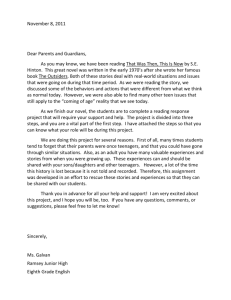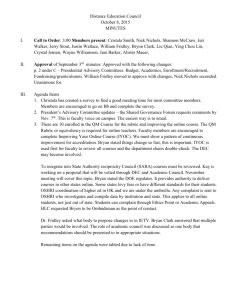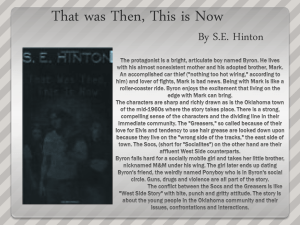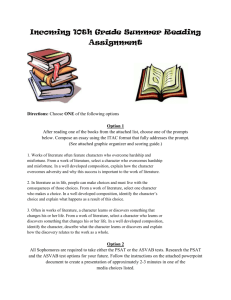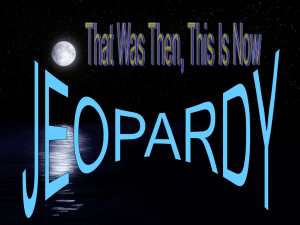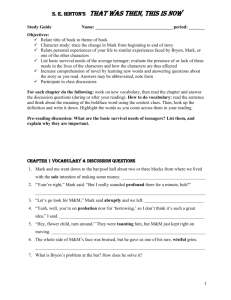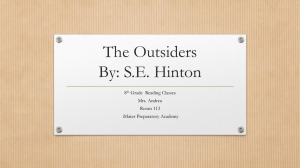Hinton, S. E. (Susan Eloise Hinton) (born 1950), U. S. author, born in
advertisement
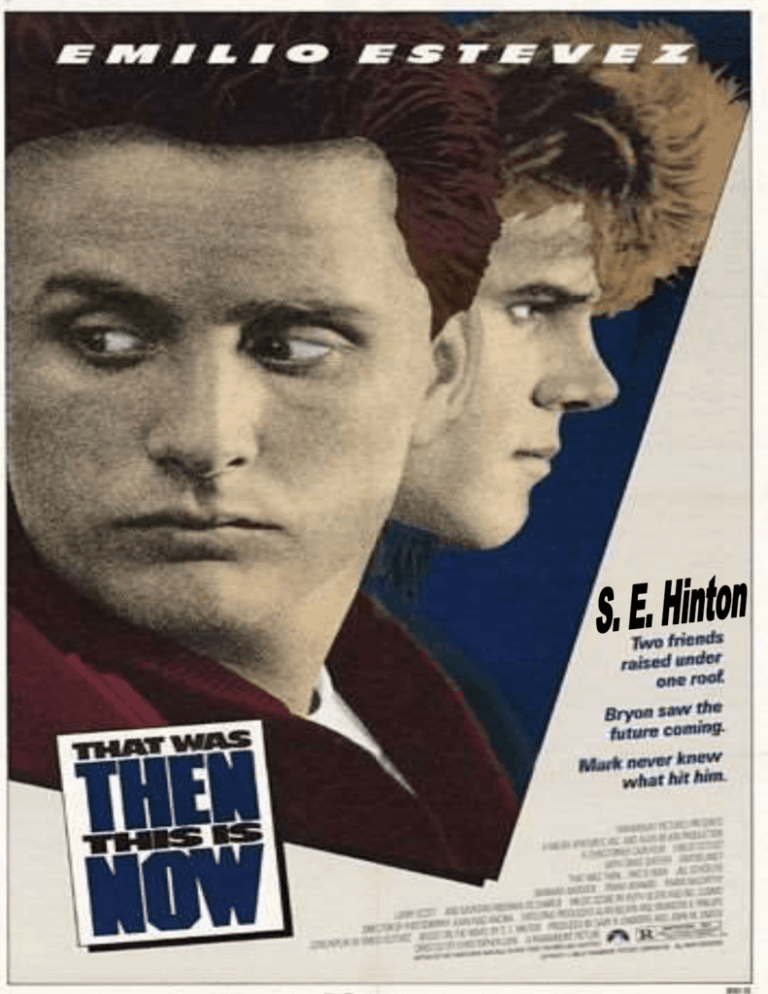
About the Author S. E. Hinton Hinton, S. E. (Susan Eloise Hinton) (born 1950), U. S. author, born in Tulsa, Oklahoma, in 1950. As a young writer, Hinton decided to write under her initials in order to deflect attention from her gender. She set out to write about the difficult social system that teenagers create among themselves. Her books struck a chord with readers who saw in her characters many elements of this system that existed in their own schools and towns. In 1967, while she was still in high school, Hinton published her first book, The Outsiders. The story of confrontation between rival groups of teenagers was immediately successful with critics and young readers, and it won several awards. There was some controversy about the level of violence in the novel and in herother works, but Hinton was praised for her realistic and explosive dialogue. The success of The Outsiders enabled Hinton to continue her education in college. She graduated from the University of Tulsa in 1970. Her other novels for young adults include That Was Then, This Is Now (1971), Rumblefish (1975), Tex (1979), and Taming the Star Runner (1988). Each of Hinton's books featured a cast of characters that suffered from society's ills. Young people alienated from their families and from their peers were seen to veer into criminal paths. Several of her books, including Tex, The Outsiders, and Rumblefish, were made into movies. ©Courtesy of Compton's Learning Company That Was Then, This is Now Elements of Plot Inciting Incident Listed below are the elements of plot present in ay story. Identify where in The Chrysalids each of the elements is used and what information is provided. 1. Exposition: provides the reader with information on the setting and the antecedent action (what happened before the story began). ________________________________________________________________________________ ________________________________________________________________________________ ________________________________________________________________________________ 2. Inciting Incident: is the first event that tells the audience the direction the plot will take. It hints at the action that will follow. ________________________________________________________________________________ ________________________________________________________________________________ ________________________________________________________________________________ 3. Rising Action: is a series of events that built to the climax. The conflict is introduced. ________________________________________________________________________________ ________________________________________________________________________________ ________________________________________________________________________________ ________________________________________________________________________________ ________________________________________________________________________________ ________________________________________________________________________________ ________________________________________________________________________________ 4. Climax: the main character confronts the forces that he faces. ________________________________________________________________________________ ________________________________________________________________________________ ________________________________________________________________________________ 5. Falling Action: The outcome of the story is made clear. ________________________________________________________________________________ ________________________________________________________________________________ ________________________________________________________________________________ 6. Conclusion: the final outcome of the story. ________________________________________________________________________________ ________________________________________________________________________________ ________________________________________________________________________________ That Was Then, This is Now Conflict Good stories have problems that the characters must solve. These problems are called conflicts. There are three types of conflict a character might face. 1. Character vs. character: when there is tension between two characters. 2. Character vs. himself: when the character struggles to make a decision. 3. Character vs. nature: when a character suffers an illness or faces a force of nature. Character vs. society: when a character defies the laws, values, and traditions of his community. Character vs. Character Character vs. Himself Character vs. Nature Character vs. Society Content Questions S. E. Hinton Chapter 1 1. What was Bryon's problem at the bar? How did he solve it? 2. Where did Mark live, and why? 3. How does Bryon describe the relationship between him and M? 4. Describe M&M. 5. What 'talent' did Mark have, and what happened to him because of it? 6. Why did Curly have a grudge against B? 7. What did M&M say when Mark said he wanted to find someone to jump? 8. Where did Mark and Bryon get the money to pay Charlie? Chapter 2 1. Where was Bryon's mother, and why? 2. How did Bryon describe himself and Mark? 3. Who was Randy? What did he do for the boys? 4. Whom did Bryon's mother ask him to visit? What did Bryon learn about this person? 5. Bryon said he had never been able to accept something. What was it? 6. Describe Bryon's first meeting with Cathy. 7. What was Mark's opinion of Mike? Who else had this opinion of Mike? Chapter 3 1. Charlie said Bryon was honest in most ways, except one. In what area was Bryon dishonest? What was Bryon's answer to Charlie's comment? 2. How did Bryon feel about Curtis, and why? What did Mark say the reason was? 3. How did M&M's father treat him? What was Cathy's opinion of this treatment? 4. What did Cathy say about Mark at the dance? What was Bryon's reaction? 5. Describe the incident involving Mark. What happened, and why? What did Bryon do? 6. How did the date with Cathy end? Chapters 4-5 1. How did Bryon and Mark spend the afternoon? 2. How did people at school feel about the fight? 3. Describe Bryon's mood on Monday. 4. Describe the incident with the principal's car. 5. What was Bryon's main problem about Cathy? 6. Mark and Bryon hustled two men in the bar. What happened after they left the bar? 7. True or False: Bryon bought Charlie's car. 8. Who understood how Bryon felt, Cathy or Mark? 9. Bryon said Mark was acting strange. What was he doing? Content Questions S. E. Hinton Chapter 6 1. What happened to the Texans? 2. How did Bryon feel about the sentence the Texans got? 3. Cathy said there were problems at home with M&M. What were they? 4. How did Bryon say he felt about Cathy? 5. What was The Ribbon, and what did Cathy, Mark, and Bryon do there? 6. What did M&M do while they were at The Ribbon? Chapter 7 1. What was Mr. Carlson's reaction to the news about his son? What did Cathy think? 2. Where did Bryon get a job? What did he change to keep it? 3. Describe Mark and Bryon's meeting with Angela and explain why the incident happened. 4. Bryon said he knew why everyone wanted to be Mark's friend. What was the reason? 5. How did Bryon find where M&M was? 6. Retell the story Mark told about his parents. 7. Bryon told Mark he couldn't help something. What was it? Chapters 8-9 1. Where did Bryon and Mark go to look for M&M? Did they find him? 2. What did Bryon and Mark discuss when they left the place? 3. What happened to Bryon while he was waiting on the steps at Terry Jones's house? 4. Did Bryon want to get even? 5. How did Mark feel about what happened to Bryon? 6. Mark said he had never worried about something before. What was it? 7. Did Bryon and Mark understand each other's opinions? 8. Where did Bryon go, alone, when he got better? What did he do there? 9. Where did Bryon and Cathy go? What did they find? What did they do about it? Chapters 10-11 1. What did Mr. Carlson tell Bryon? How did Bryon feel about it? 2. Bryon said something was getting easier. What was it? 3. What did Bryon find when he looked for Mark's cigarettes? What did he do after he found it? 4. What did Bryon tell Mark when he got home? What was Mark's reaction? 5. What did Bryon's mother say when she heard what had happened? 6. What punishment did Mark receive? Why did the judge give him that punishment? 7. What happened to M&M? 8. What happened to Bryon and Cathy? 9. Describe the last meeting between Bryon and Mark. 10. How did Bryon feel at the end of the story? Vocabulary Chapter 1 S. E. Hinton Chapter 1 Part I: Using Prior Knowledge and Context Clues Below are the sentences in which the vocabulary words appear in the text. Read each sentence. Use any clues you can find in the sentence combined with your prior knowledge, and write what you think the underlined words mean on the lines provided. 1. Mark and me went down to the bar/pool hall about two or three blocks from where we lived with the sole intention of making some money. __________________________________________________________________________ 2. "You're right," Mark said. "But I really sounded profound there for a minute, huh?" ________________________________________________________________________ 3. "Let's go look for M&M," Mark said abruptly and we left. __________________________________________________________________________ 4. "My sister's home," he added as an afterthought. "No kidding?" asked Mark tactfully, thumbing through a Playboy. "Which one?" __________________________________________________________________________ 5. "Yeah, well, you're on probation now for 'borrowing,' so I don't think it's such a great idea," I said. __________________________________________________________________________ 6. "Hey, flower child, turn around," they were taunting him, but M&M just kept right on moving. __________________________________________________________________________ Part II: Determining the Meaning Match the vocabulary words to their dictionary definitions. 1. sole 2. profound 3. abruptly 4. tactfully 5. probation 6. taunting A. suddenly B. supervised freedom for lawbreakers C. insulting D. single; only E. dealing with people in a skillful way F. intellectual Vocabulary Chapter 2 S. E. Hinton Chapter 2 Part I: Using Prior Knowledge and Context Clues Below are the sentences in which the vocabulary words appear in the text. Read each sentence. Use any clues you can find in the sentence combined with your prior knowledge, and write what you think the underlined words mean on the lines provided. 1. As a result, I was putting on weight--I wasn't in much danger of getting fat since it seemed like I was growing an inch taller a week--and Mark was staying as slight and slender as ever. You'd never guess Mark was as strong as he was by looking at him, but I knew. . . he was as tough as a piece of leather. __________________________________________________________________________ 2. If there was a lame dog within three miles, she'd find it. __________________________________________________________________________ 3. I was five-ten at sixteen and still growing, but I went through my lanky period at fourteen and I had a good build, of which I was proud. __________________________________________________________________________ 4. "The last time that happened, my brother busted a bottle over the guy's head and got charged with assault with a dangerous weapon." __________________________________________________________________________ 5. As we got into the elevator, Mark said, "I'm inclined to agree with his old man. That is one stupid guy." __________________________________________________________________________ Part II: Determining the Meaning Match the vocabulary words to their dictionary definitions. 1. slight 2. lame 3. lanky 4. assault 5. inclined A. attack B. tall and skinny C. light in form or build D. likely or tending to E. having an injured foot or leg Vocabulary Chapter 3 S. E. Hinton Chapter 3 Part I: Using Prior Knowledge and Context Clues Below are the sentences in which the vocabulary words appear in the text. Read each sentence. Use any clues you can find in the sentence combined with your prior knowledge, and write what you think the underlined words mean on the lines provided. 1. "For one thing, you know how often the plainclothes cops stop in. Do you think they'd let a minor work here? You're lucky you can just come in and sit down." __________________________________________________________________________ 2. She was smiling with that sassy smirk, and I wondered why on earth I'd ever given a damn about her. __________________________________________________________________________ 3. Her face was contorted for a second, and she called me a few names and flounced off. __________________________________________________________________________ 4. Her face was contorted for a second, and she called me a few names and flounced off. __________________________________________________________________________ 5. "Then the cops showed up. Right in the nick of time," he added sarcastically. __________________________________________________________________________ Part II: Determining the Meaning Match the vocabulary words to their dictionary definitions. 1. minor 2. sassy 3. contorted 4. flounced 5. sarcastically A. twisted out of shape B. one who is below the legal age C. rude D. in a mocking manner E. moved in a bouncy or lively manner Vocabulary Chapter 4-5 S. E. Hinton Chapters 4-5 Part I: Using Prior Knowledge and Context Clues Below are the sentences in which the vocabulary words appear in the text. Read each sentence. Use any clues you can find in the sentence combined with your prior knowledge, and write what you think the underlined words mean on the lines provided. 1. But Mark was always the hub of this circle of people, and I was always with Mark. _________________________________________________________________________ 2. "We've had some good times, huh, Bryon?" Mark broke the silence. I guess we both had been reminiscing. __________________________________________________________________________ 3. This can make for problems. It used to, anyway, with the Socs beating up the greasers, but in these days, with all that love, peace, and groove stuff, the fights had slacked off. __________________________________________________________________________ 4. I have a vague notion that the Left is Hippie and the Right is Hick, but I really don't know much else. __________________________________________________________________________ 5. "I happened to be standing around when the aforementioned incident occurred." __________________________________________________________________________ 6. This was an invitation for me to buy her a soda, so I said obligingly, "Want a Coke?" __________________________________________________________________________ 7. "See ya 'round, kids," the Texans said as they sauntered out. ________________________________________________________________________ 8. We couldn't resist smirking a little as we walked past the Texans. Even in the dark I could see the anger contorting their faces. __________________________________________________________________________ Part II: Determining the Meaning Match the vocabulary words to their dictionary definitions. 1. hub 2. reminiscing 3. slacked 4. vague 5. aforementioned 6. obligingly 7. sauntered 8. smirking A. sneering B. willingly C. indistinct D. strolled E. slowed F. center G. said before H. remembering past events Vocabulary Chapter 6-7 S. E. Hinton Chapters 6-7 Part I: Using Prior Knowledge and Context Clues Below are the sentences in which the vocabulary words appear in the text. Read each sentence. Use any clues you can find in the sentence combined with your prior knowledge, and write what you think the underlined words mean on the lines provided. 1. He watched me closely at first-- I guess he couldn't forget that by the time the police had showed up at Charlie's I had been hysterical. He didn't have to worry. I went through the whole trial calm, collected, numb, and empty. __________________________________________________________________________ 2. I didn't feel glad, or vengeful, or anything. I really hadn't much cared whether or not they even caught those guys. __________________________________________________________________________ 3. I was puzzled. "So what?" She gave me an incredulous look. "So what? Have you smoked it?" __________________________________________________________________________ 4. Cathy was sitting next to me, Mark on her other side, and M&M was hanging out the window, gravely watching people, waving if he was waved to, yelling back if he was yelled at, always slightly surprised at the crudity of the calls, as if he hadn't heard the same things a hundred thousand times before. __________________________________________________________________________ 5. I realized right then that whatever chance Mark and Cathy had of becoming friends was gone. I had already sensed in Cathy the same hostility toward mark that he had for her. __________________________________________________________________________ 6. "Then why didn't you ever tell him so?" Cathy sobbed irrationally. __________________________________________________________________________ 7. One night a couple of weeks after M&M disappeared, Mark and me went goofing around by ourselves again. It was almost as if we had never felt a gulf between us, never been separated by something we couldn't see. __________________________________________________________________________ Part II: Determining the Meaning Match the vocabulary words to their dictionary definitions. 1. hysterical A. in an uncontrolled, excitable state 2. vengeful B. seriously 3. incredulous C. distance 4. gravely D. not logically 5. hostility E. doubtful 6. irrationally F. ill will; extreme anger 7. gulf G. wanting to give punishment for a wrong Vocabulary Chapter 8-9 S. E. Hinton Chapters 8-9 Part I: Using Prior Knowledge and Context Clues Below are the sentences in which the vocabulary words appear in the text. Read each sentence. Use any clues you can find in the sentence combined with your prior knowledge, and write what you think the underlined words mean on the lines provided. 1. "Brother, you look like you been through a meat grinder." "That's what it feels like, too," I said, even though this witticism cost me more stabbing pains in my sides. __________________________________________________________________________ 2. Mom nearly had a fit when she saw me. She was well by then, back at her job. I almost gave her a relapse. I had never been so messed up. __________________________________________________________________________ 3. "Yeah. Mark says he's seen him at this hippie commune-house." Cathy looked shocked. "One of those freelove places?" __________________________________________________________________________ Part II: Determining the Meaning Match the vocabulary words to their dictionary definitions. 1. witticism A. a group of people living together 2. relapse B. slipping back 3. commune C. joke Vocabulary Chapter 10-11 S. E. Hinton Chapters 10-11 Part I: Using Prior Knowledge and Context Clues Below are the sentences in which the vocabulary words appear in the text. Read the sentence. Use any clues you can find in the sentence combined with your prior knowledge, and write what you think the underlined words mean on the lines provided. 1. "Bryon, you know what something like this would do to me with my record. Bryon, tell me you're lyin'." Mark was pleading desperately. __________________________________________________________________________ 2. "Bryon, you know what something like this would do to me with my record. Bryon, tell me you're lyin'." Mark was pleading desperately. __________________________________________________________________________ 3. Mark had a hearing, or a trial, or whatever--I never paid any attention to the formalities. __________________________________________________________________________ 4. "O.K.," he said, but he looked half-scared, and his old expression of complete trust and intent interest was gone entirely. He looked like a little kid--I had forgotten he was just a little kid. __________________________________________________________________________ 5. I seemed to have become a mixture of things I had picked up from Charlie, Mark, Cathy, M&M, Mom, and even obscure people like Mike and the blonde hippie-chick and the Shephards. __________________________________________________________________________ Part II: Determining the Meaning Match the vocabulary words to their dictionary definitions. 1. pleading A. customs 2. desperately B. begging 3. formalities C. unclear 4. intent D. hopelessly 5. obscure E. resolute Figurative Language S. E. Hinton FIGURES OF SPEECH Figures of speech are literary devices that give the writer a non-literal way to describe images and events. The main types of figures of speech are hyperbole, irony, metaphor, metonymy, onomatopoeia, paradox, personification, and simile. Use the following chart to record examples of figures of speech used in That Was Then, This Is Now. A sample has been done for you. HYPERBOLE Extreme exaggeration used to describe a person or thing. For example: She had as many pairs of shoes as there are stars in the sky. IRONY The use of words to express something different from and often opposite to their literal meaning. METAPHOR A comparison without the words like or as. For example, The cat is a bag of bones. METONYMY A figure of speech in which one word or phrase is substituted for another with which it is closely associated, as in the use of Washington for the United States government or of the sword for military power. ONOMATOPOEIA The use of words such as buzz or splash that imitate the sounds associated with the objects or actions they refer to. PARADOX A seemingly self-contradictory statement that has some truth to it. PERSONIFICATION Attributing human characteristics to inanimate objects, animals, or ideas, as in the wind howled. SIMILE A comparison using the words like or as. Figurative Language S. E. Hinton Figure of Speech simile Example from Novel I look like a baby- faced kid. Page Literal # Meaning p. 1 Bryon looks young Quotation Significance S. E. Hinton Discuss the significance of the following quotations. 1. "It was a donation," Mark said seriously, "for the Cause." "What cause?" "Cause we owe it to Charlie," Mark said . . . 2. "You make me sick! You just rescued me from some guys who were going to beat me up because I'm different from them, and now you're going to beat up someone because he's different from you. You think I'm weird-well, you're the weird ones." 3. "Kill the white bastard." 4. "Yeah, I mean it. Man, if anybody ever hurt me like that I'd hate them for the rest of my life." 5. "Bryon, you're an honest kid in most ways, but you lie like a dog. Take Mark--I wouldn't trust him around anything that wasn't nailed down, but I'd believe anything he said. I'd trust you with my wife, if I had one. I trust your actions, but I double-check most of your statements. You just think about it, and I think you'll come up with the reason why you haven't got a job before now. You just think about it/" 6. "You're jealous, Bryon, because Angela dumped you to make a play for Curtis, and he was smart enough to leave her alone." 7. If you have two friends in your lifetime, you're lucky. If you have one good friend, you're more than lucky. 8. "I'd forgotten how beautiful he is. I know girls who would give their eye teeth for hair that color." 9. You know what the crummiest feeling you can have is? To hate the person you love best in the world. 10. "Certainly uses nice language. A real lady." 11. "Buddy boy, you are dead. You had just better make up your mind to that. When I get through with you, you are going to be dead." Plotting Chapters S. E. Hinton Word Search S. E. Hinton Crossword Puzzle S. E. Hinton Crossword Puzzle S. E. Hinton

